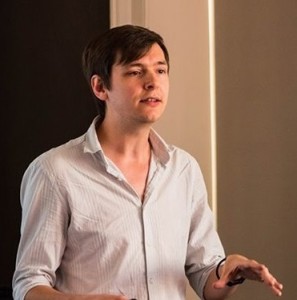Our Project Director Michael Marshall has been visiting schools with an unusual mission: to highlight proofs that the Earth is actually flat, and to encourage students to question the shape of their world.

In his talk, Marshall runs through the ten most common and persuasive arguments that the world is not a spinning ball, pointing out inconsistencies in the conventional globe model, and demonstrating how basic observations can be used to cast doubt on the consensus view of the universe.
However, things are not quite as they seem, as the goal of the talk is actually to encourage critical thinking, and to get students to question what sources they can trust and what arguments can be taken as credible.
After introducing the top ten arguments in favour of a flat Earth, Marshall critiques each of his own arguments, pointing out the flaws in the ‘evidence’ and providing the context that showed each proof to be misleading.
Marshall and Good Thinking are keen to take the lecture to more schools, and to reach more students. In fact, Good Thinking are happy to offer this lecture for free to five schools in the Merseyside area (and the surrounding area).
Marshall said, “Many students have been exposed to some Flat Earth arguments previously, in YouTube videos and on social media, where these kind of views have flourished. When people first encounter these so-called proofs, they can seem incredibly persuasive… however, when students are given the time and encouragement to question these arguments, they are often able to see why they simply don’t hold up.
“Every single one of the Flat Earth arguments I presented in my talk are genuine arguments taken from some of the most successful and persuasive Flat Earth videos and lectures out there, and these are the arguments responsible for convincing so many people to believe the world is flat. By showing each of these arguments, and then going through the logic and counter evidence that debunks each proof, my aim is to encourage students to sense-check the arguments they encounter… and ask if sources of information are reliable.
“Discussing the Flat Earth belief provides a fun and interesting way to teach critical thinking skills and to help students see how to question the credibility and source of arguments, especially when they encounter them online. However, these ideas don’t exist in isolation, and the same kind of arguments that lead people to believe the world is flat are also used to persuade people that climate change is a hoax, or that vaccines are dangerous, and many other things besides. The aim is to arm students with the critical thinking tools that will help them question these harmful ideas, too.”
John Smith, Head of Maths and Head of Teaching, Royal Grammar School in Newcastle-upon-Tyne, said: “Michael visited our school recently to give a talk to our Sixth Form Maths Society. He was a very engaging speaker: well-prepared, passionate and informed, his talk was superb. Our students were interested enough to do their own research into the topic afterwards. His use of video and social media links went down very well and he pitched the topic at a very good level for his audience. We look forward to inviting him back next year!”
Pam Stokell, Head of Academic Enrichment at King Alfred’s Academy in Wantage, said: “Michael Marshall gave a truly inspiring talk to our students and parents as part of our school’s series of Academic Enrichment Talks. We had a mixed audience with students from Year 6 to Year 13, as well as accompanying parents, and the questions raised by the students were a clear testament to how engaging and stimulating they found the talk. We would not hesitate to recommend Michael to other schools.”
One parent who attended the talk said: “My two children and I were lucky enough to attend Michael Marshall’s first presentation on Flat Earth belief to a school. Flat Earth believers say we should “question everything” and Michael asked what if you apply that to the idea of a Flat Earth? This well structured talk then took us through the “facts” of why the Earth is flat and showing how each was flawed. The age range in the audience was very wide; the number and quality of the questions from younger children through to parents demonstrated how much they had gained from this talk.”
If you would like Good Thinking to speak to your students, we’d like to hear from you. In exchange for a £400 contribution to our charity (plus travel expenses), we will happily visit your school and give a 45-minute long lecture, followed by an extensive Q&A. We are also offering this lecture for free for up to five Merseyside-based schools. To find out more, please contact marsh@goodthinkingsociety.org.

